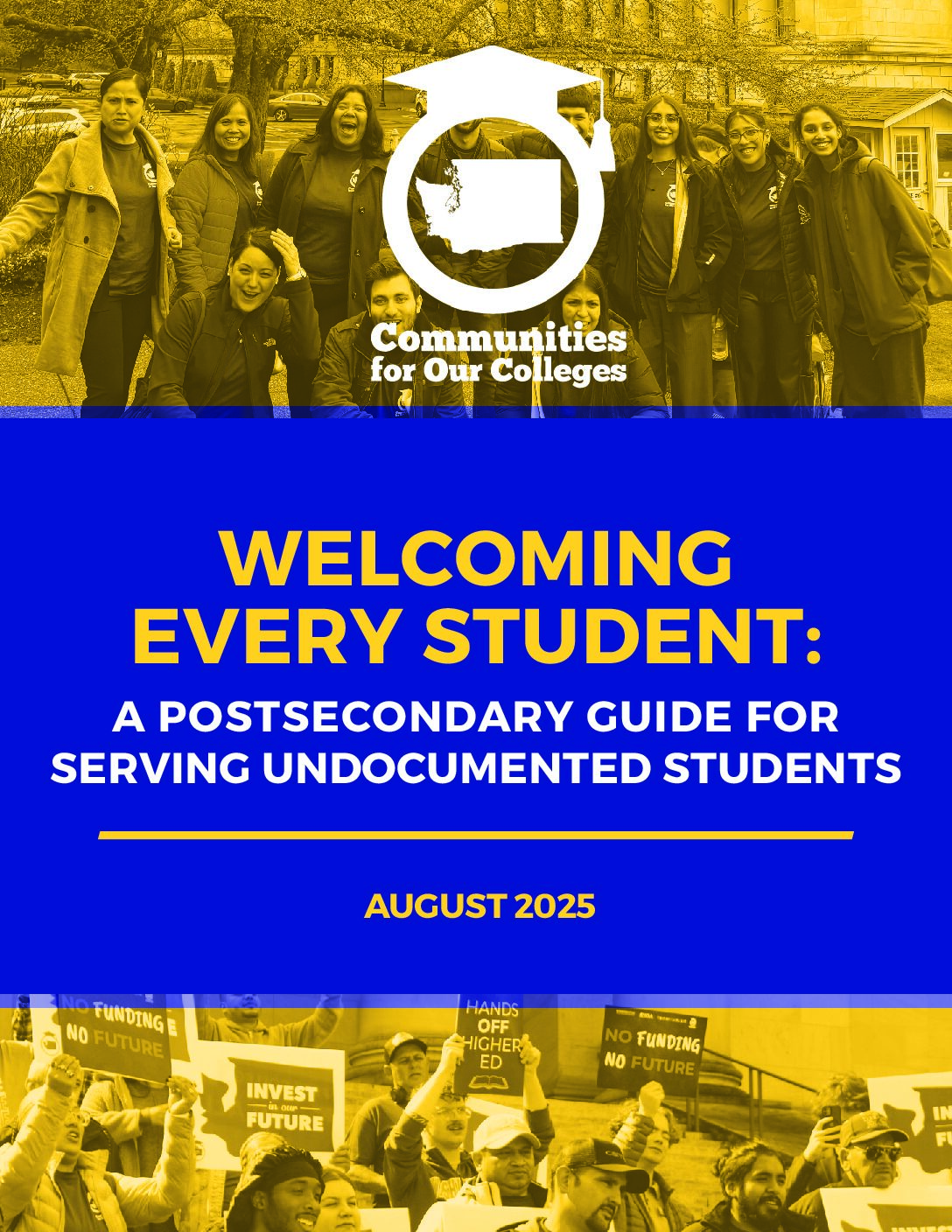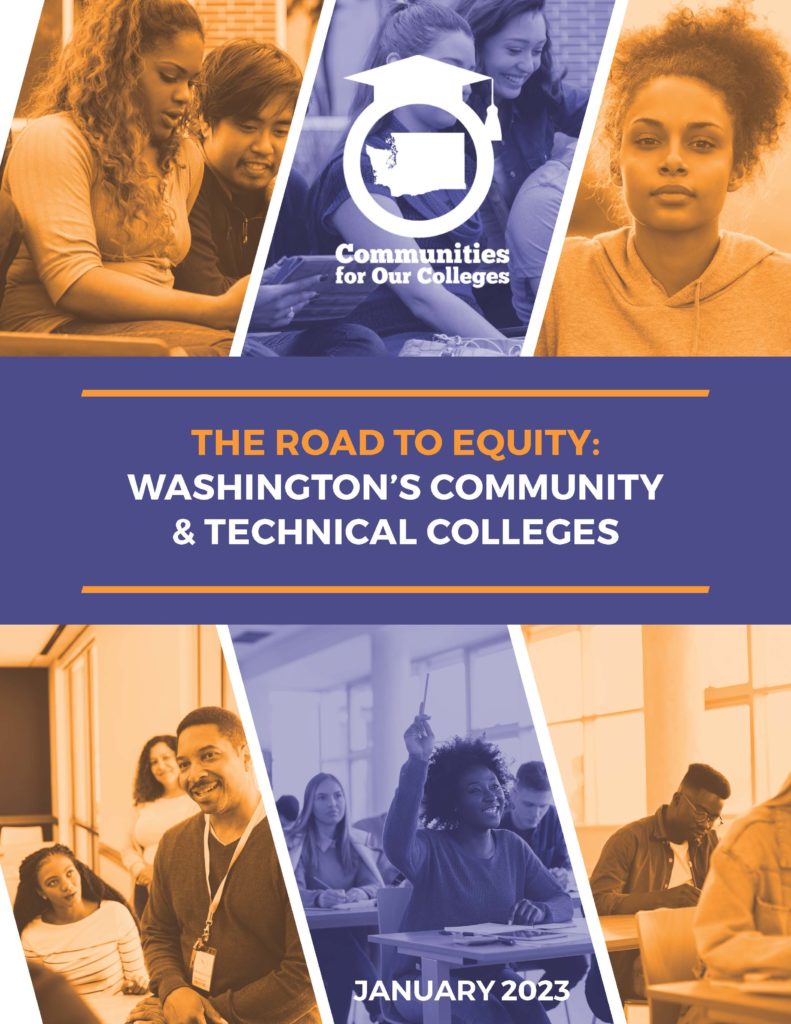Report: Building Toward Equity: Lesson’s from Washington’s Community

This statewide assessment examines how Washington’s 34 community and technical colleges are advancing equity under SB 5194. The report highlights progress in dismantling systemic racism, identifies gaps in implementation, and offers actionable recommendations for building lasting, equity-centered infrastructure. Rooted in racial justice and informed by data, it provides a roadmap for translating institutional commitments into measurable change for students and communities.
Welcoming Every Student: A Postsecondary Guide for Serving Undocumented Students
Washington is a pro-immigrant state that recognizes immigrant communities as essential to our shared future. For decades, our state has invested in immigrant and undocumented students, knowing that expanding educational access strengthens families, communities, and the workforce. Yet today, undocumented immigrants face renewed attacks nationwide. In this context, Washington must continue to lead—ensuring that all students, regardless of immigration status, can access higher education and build meaningful careers.
To support this goal, we’ve created two comprehensive toolkits:
- Educator Toolkit – Designed for higher education stakeholders, administrators, faculty, and community partners, this guide offers clear policy context, best practices, and resources to help institutions support undocumented students, remove barriers, and advance equity in college access and completion.
- Family Toolkit – Created for undocumented students and their families, this guide provides step-by-step information on applying to college, securing state financial aid through WASFA, finding scholarships and internships, understanding rights, and connecting with food, housing, child care, and mental health resources. The Family Toolkit is available in Spanish to ensure broader access.

Every year, thousands of undocumented students graduate from Washington high schools, ready to contribute to our communities as teachers, engineers, health care workers, entrepreneurs, and civic leaders. By investing in their success, we strengthen local economies, address workforce needs, and create a more equitable future for all. These toolkits are part of our commitment to racial equity and our belief that every student—regardless of immigration status—deserves the opportunity to learn, grow, and thrive.
Building an Equity Action Plan: A Toolkit for Students, Faculty, & Staff in Washington’s Community & Technical Colleges
Community colleges in Washington state have the potential to close racial and economic gaps in the state. Most students in the state’s Community & Technical Colleges (CTCs) are BIPOC, immigrant & refugee, and low-wealth students. These colleges are crucial pathways to social and economic attainment for many communities that have been historically discriminated against and face barriers to progress.
But for CTCs to fulfill their potential as vehicles for equity, they must also be equitable in their hiring, policies, and practices. Advancing equity in community colleges — racial, gender, and class equity, etc. — will, in turn, advance equity in the state as a whole. But achieving equitable outcomes in our institutions of higher education is not easy.
This toolkit is a guide for stakeholders to achieve equity outcomes in our colleges, rooted in successful examples, universal principles, and social change methods.

For CTCs to fulfill their potential as vehicles for equity, they must also be equitable in their hiring, policies, and practices. Advancing equity in community colleges — racial, gender, and class equity, etc. — will, in turn, advance equity in the state as a whole. This toolkit is a guide for stakeholders to achieve equity outcomes in our colleges, rooted in successful examples, universal principles, and social change methods.
Report: The Road to Equity – Washington’s Community & Technical Colleges
Racial equity and justice are essential to ensure education benefits everyone. Washington’s Community and Technical Colleges (CTCs) are crucial drivers of equity in higher education in Washington state, with 45% of CTC students drawn from BIPOC communities. This new report examines how the colleges are progressing on the path to equity and what can be done to move ahead.
In January of 2023, we published our report, The Road to Equity – Washington’s Community & Technical Colleges, which examines how Washington State’s CTCs are progressing on the path to equity and what can be done to move ahead.
Prior to 2020, Washington state had begun to take some steps toward creating more equitable CTCs. Notably, in 2019, legislation was passed to create a dedicated account for the state need grant program, now the Washington College Grant, expanding eligibility. Students from families making up to 55% of the state’s median income will qualify for full grants covering all tuition costs, with those making up to median income eligible for partial grants.
In addition, the legislation provides additional funding for Guided Pathways, Career
Connected Learning, salary increases to nursing and high-demand faculty, limited crisis
funding for housing and food emergencies, and limited childcare subsidies for CTC students.
The steps, however, only address a small portion of the existing need. As this need was
magnified by the impact of Covid-19, the need for additional legislative efforts became clear. To this end, the Washington State Legislature passed SB 5149 in 2021, appropriating $33 million to support its implementation. SB 5149.

Racial equity and justice are essential to ensure education benefits everyone. Washington’s Community and Technical Colleges (CTCs) are crucial drivers of equity in higher education in Washington state, with 45% of CTC students drawn from BIPOC communities. This new report examines how the colleges are progressing on the path to equity and what can be done to move ahead.